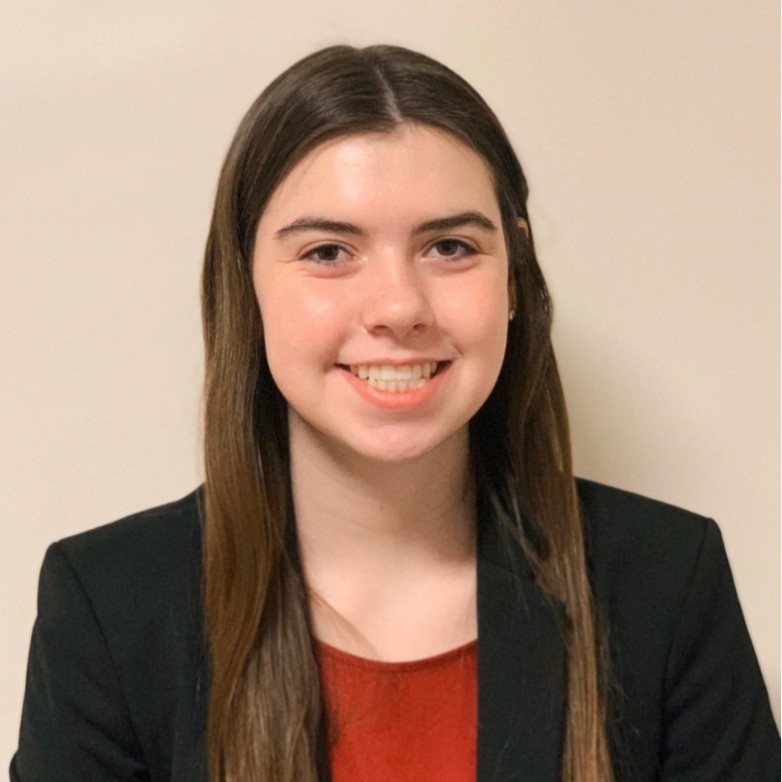A journalism cover letter is a brief, formal letter that accompanies the resume of someone applying to be a journalist.
The cover letter usually includes information about the applicant’s qualifications, including their journalism experience, to show employers that they have the necessary skills, such as reporting, investigating, interviewing, etc., that are needed in a journalist.
The main purpose of a cover letter is to introduce the applicant to the potential employer and provide a summary of their background and qualifications. Therefore, it should be brief yet informative. The letter can be addressed to different individuals, such as an editor or reader at a particular media/publishing company, as well as any hiring managers for an individual position within that company.
It is an effective way of distinguishing yourself from other applicants with similar credentials. This can greatly boost your chances of securing the job, especially in entry-level positions.
In addition, writing a cover letter ensures you create a lasting impression on the employer by offering them additional information that was not communicated through your resume. As such, your cover letter will outline your specific skills with context, reasons why you want and qualify for the job, your contribution to your previous job position, and other details that illustrate your suitability and competency.
Often the personalization of the cover letter is advised. A personalized letter shows that you are dedicated to the job offered and are not just applying for the position with a generic journalism cover letter.
This article will competently guide you on how to write a solid journalism cover letter and offer examples of how to write its components and other informative details.
How to Professionally Format a Journalism Cover Letter
The format of a cover letter usually depends on the job description and its requirements. However, some standard formatting essentials will aid you in creating a professional cover letter. Knowing how to format a cover letter requires you to have an understanding of what information should be included in it.
Here are some tips and guidelines for professionally formatting a journalism cover letter:
- Use a one-inch margin on all sides.
- Ensure the spacing of the letter is 1 or 1.15. Also, leave empty spaces between sections of the letter and paragraphs.
- Write the letter in an elegant and professional font the same one that you used in your resume.
- Use a font size of between 11 to 12 points.
- Align the contents of the letter to the left.
- Maintain the length of the letter at a maximum of one page.
6 Steps to Writing a Good Journalism Cover Letter
If you are looking for work as a journalist, you will want to create a cover letter that shows your journalism experience as well as your interest in and suitability for the position. The cover letter should follow all of the standard rules for writing and formatting it.
The following are the six steps to follow when writing a good journalism cover letter:
Step 1: Briefly introduce yourself
Briefly mention who you are and the purpose of the letter, which is to apply for the journalist position. A strong introduction prepares the reader for what to expect in the cover letter. Mention the position you are applying for as well as an achievement or a testament to why you are suitable for the job.
EXAMPLE
I want to apply for the editor-in-chief position at your company. My work experience is as a full-time reporter and editor at The Phoenix. In addition, I was the assistant editor of The Drape Newspaper. I have also worked as a staff reporter for Sunlight Times and as a news editor at the local print publication, The Daily Journal. As such, I believe my vast experience qualifies me as a suitable candidate for the position.
Step 2: Show that you are the perfect candidate
The body paragraphs should include information about the applicant’s related experience or credentials that are relevant to the job description. Each point should be relevant. Look at the employer’s needs and expectations in the job description before you begin writing your cover letter.
This gives you an idea of the ideal candidate the employer is looking for. Ensure to check out each organization’s specific job description and what they are looking for in an employee.
Reference your portfolio. For example, if you have worked as a reporter or columnist for your school magazine or newspaper, then be sure to mention that in your cover letter by inserting relevant links. If you have received awards or professional accomplishments in journalism, be sure to mention them.
EXAMPLE
I worked as a news reporter and editor while attending New York State University, earning Outstanding Achievement awards for my work both in my journalism career and in other professional settings. I am currently a staff reporter at the local newspaper, The Flag News. In my recent seven months there, I have been able to conduct investigations into major crimes such as mass shootings and sexual assault. My local reporting experience has also prepared me to work with ABC Inc. as a journalist on investigative projects.
Step 3: Explain why you want the position
This is one of the key sections of the letter that should be highlighted. Explain how the opportunity to work for the employer would positively impact your career and personal growth in this step. You can achieve this by referencing any of the publisher’s past articles that have caught your attention and/or interest.
Show genuine interest in the organization and indicate your intentions to stay with them for a significant period by mentioning any long-term benefits you can gain from the job, for example, networking. You can also achieve this by expressing shared professional beliefs and shared values.
This is one that should be highlighted. Explain this step. You can achieve this by referencing any of the publisher’s past articles that have caught your attention and/or interest.
Show genuine interest in the organization and indicate your intentions to stay with them for a significant period by mentioning any long-term benefits you can gain from the job, for example, networking. You can also achieve this by expressing shared professional beliefs and shared values.
EXAMPLE
As a journalist and editor, I have developed the skills to research, write, and publish investigative reports as well as more traditional news reports and stories. I also possess excellent interpersonal communication skills. I am familiar with modern journalism practices from my experience in online media and blogging, regularly contributing to sites including The Daily Journal, Sunlight Times, Blogging for Change, and others.
Step 4: Discuss what impact you can make on them
In the body of your letter, you should focus on a few key points that demonstrate why you can be an asset to the company. It is important to address this by using examples from previous job positions and highlighting qualifications specifically in terms of the job description.
Quantify what you can do for them by referring to the achievements in the resume. Avoid reiterating your duties in detail and focus on the impact or results of your contributions at work. You can determine what to include by identifying the challenges the employer is currently facing and the primary job requirement.
EXAMPLE
My work has been published widely in local newspapers. I intend to produce industry-standard publications. I’m able to produce 5 columns of reports per week. My ability to convey information guarantees to attract a wide audience and retain returning readers. I can bring my expertise in article blogging to help The Mirror News transition into online publishing.
Step 5: Show how passionate you are about the job
You should establish how serious you are about performing the job in addition to wanting to work for their organization. This is a good way to demonstrate your enthusiasm, which employers look for in their employees.
Demonstrate how you are driven by your career and ensure that you show your commitment by emphasizing how your background will positively contribute to the organization. Also, show how your goals and those of the organization align.
EXAMPLE
I enjoy working with companies such as yours that support the community’s interests by promoting positive solutions to social issues. I’d like to join your organization in informing your readers and ensuring the people have a voice and medium to reach authorities.
Step 6: Incorporate a call to action and sign off
The closing paragraph should re-emphasize why you are an ideal candidate for the job and how you would like to be contacted about an interview or job offer. This should be a call to action.
You can request a call or a meeting. This demonstrates that being hired will be more valuable to the organization than to you. Then sign off the letter with a complimentary close and your name.
EXAMPLE
I am highly motivated and eager to work with you and help build your business. If you’re interested in my application, please contact me at cgibbons@email.com for an interview.
Sincerely,
Cindi Gibbons
Sample Cover Letter
Dear Hiring Manager,
I am writing to express my interest in the journalist position at NewsVoice Daily, as advertised on your website. With a bachelor’s degree in Journalism from Springfield University and three years of experience in investigative reporting, I believe I am a strong candidate for this role.
At my current position at City Times, I have honed my skills in fact-checking, interviewing, and delivering compelling news stories under tight deadlines. My dedication to uncovering the truth and presenting it in an engaging manner has led to a 20% increase in readership for my column. I specialize in political reporting but have also covered a wide range of topics, from local events to international news.
What excites me most about the opportunity at NewsVoice Daily is your commitment to unbiased and impactful journalism. I am particularly impressed by your recent series on climate change, which not only informed the public but also initiated meaningful discussions. I am eager to bring my expertise in investigative journalism and my passion for storytelling to your esteemed publication.
Thank you for considering my application. I look forward to the possibility of contributing to your team and am available for an interview at your earliest convenience.
Sincerely,
Jordan Smith
Analysis
The cover letter provided serves as a practical example for writing a professional cover letter, specifically tailored for a journalism position. Its structure is logically divided into four distinct paragraphs, each serving a specific purpose, which provides a clear framework for conveying the necessary information. The first paragraph efficiently sets the context by stating the intent and the applicant’s relevant educational background. In the subsequent paragraphs, the focus shifts to the applicant’s professional experience and skills. Here, the writer effectively uses specific examples and quantifiable achievements, such as the increase in readership due to their contributions, which illustrates their competence and potential impact.
Key aspects to observe from this example include:
- Structured Approach: The letter is organized into an introduction, a detailed professional background, specific accomplishments, and a concluding section.
- Detail-Oriented Content: The writer provides detailed information about past experiences, demonstrating their skills and achievements.
- Relevance to Position: The letter specifically addresses the requirements and ethos of the prospective employer.
- Professional but Approachable Tone: While the language is formal and professional, it avoids being overly promotional, maintaining an informative yet approachable tone.
- Clear Conclusion: The writer ends the letter with an invitation for further discussion, which is a standard practice in cover letters.
This cover letter can be a useful guide for individuals looking to draft their cover letters for journalistic roles. It demonstrates how to present qualifications and experiences in a way that is both informative and aligned with the requirements of the prospective job.
Journalism Cover Letter Templates
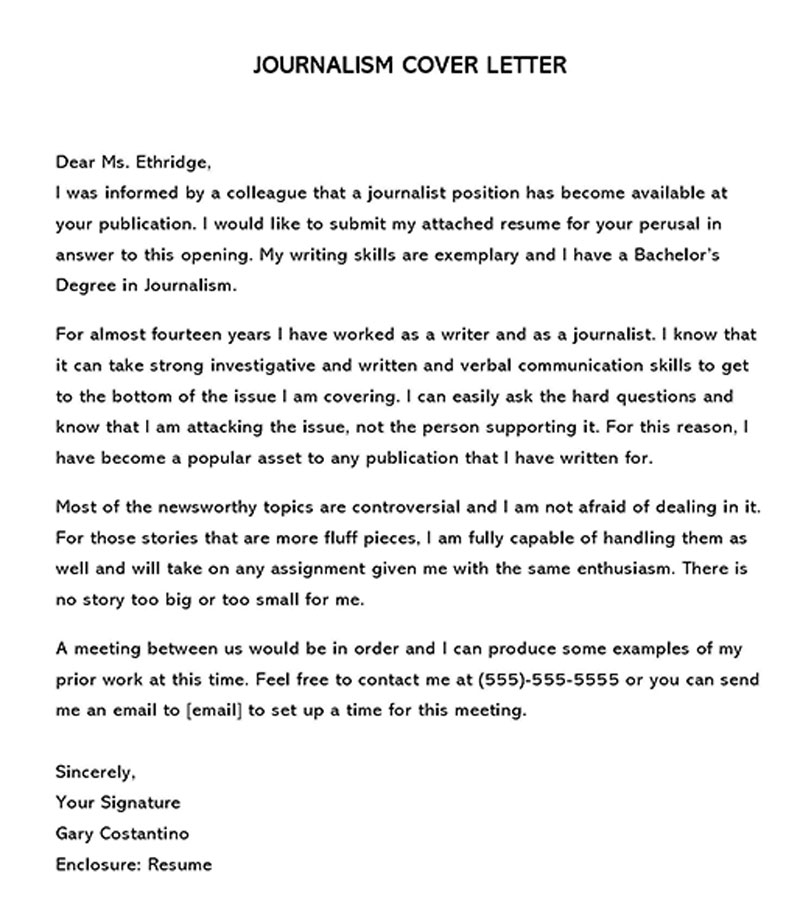
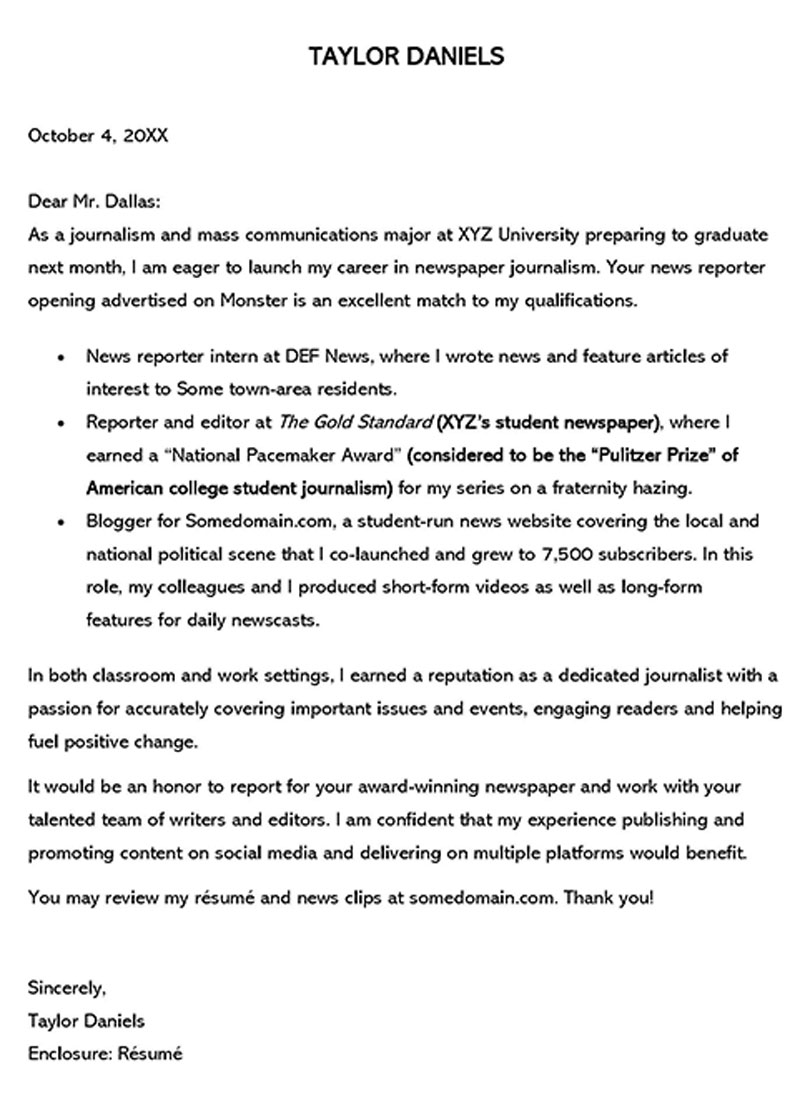
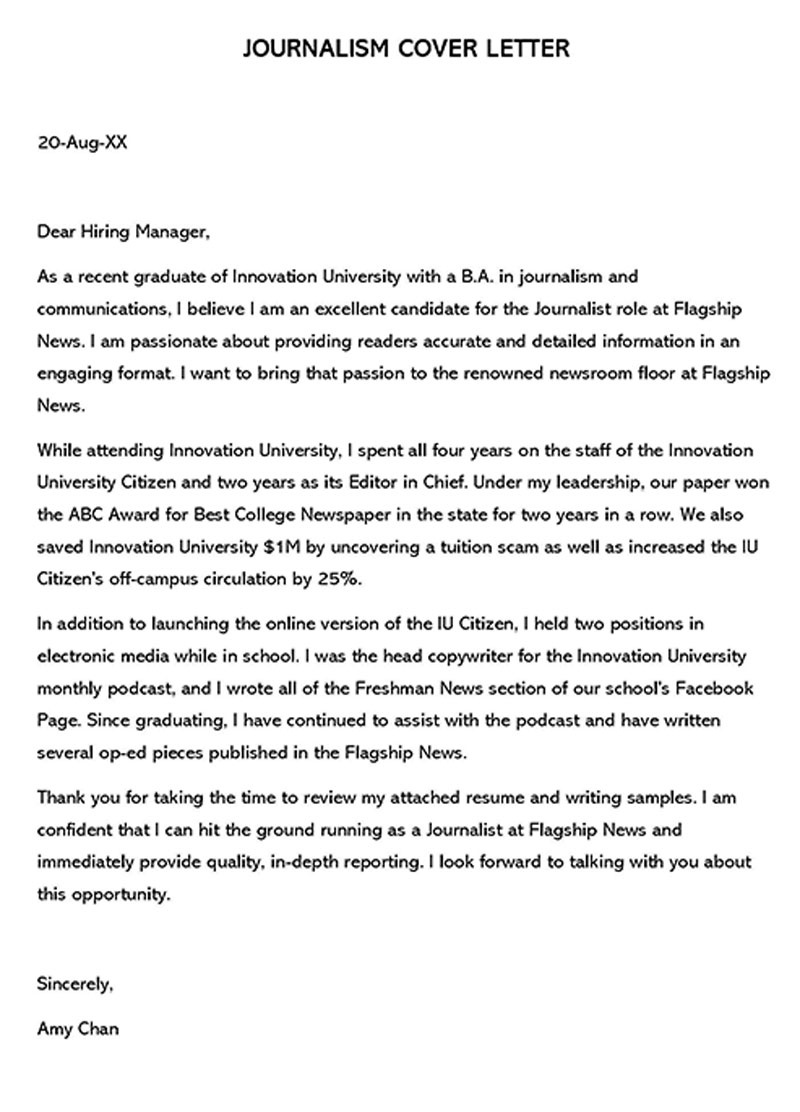
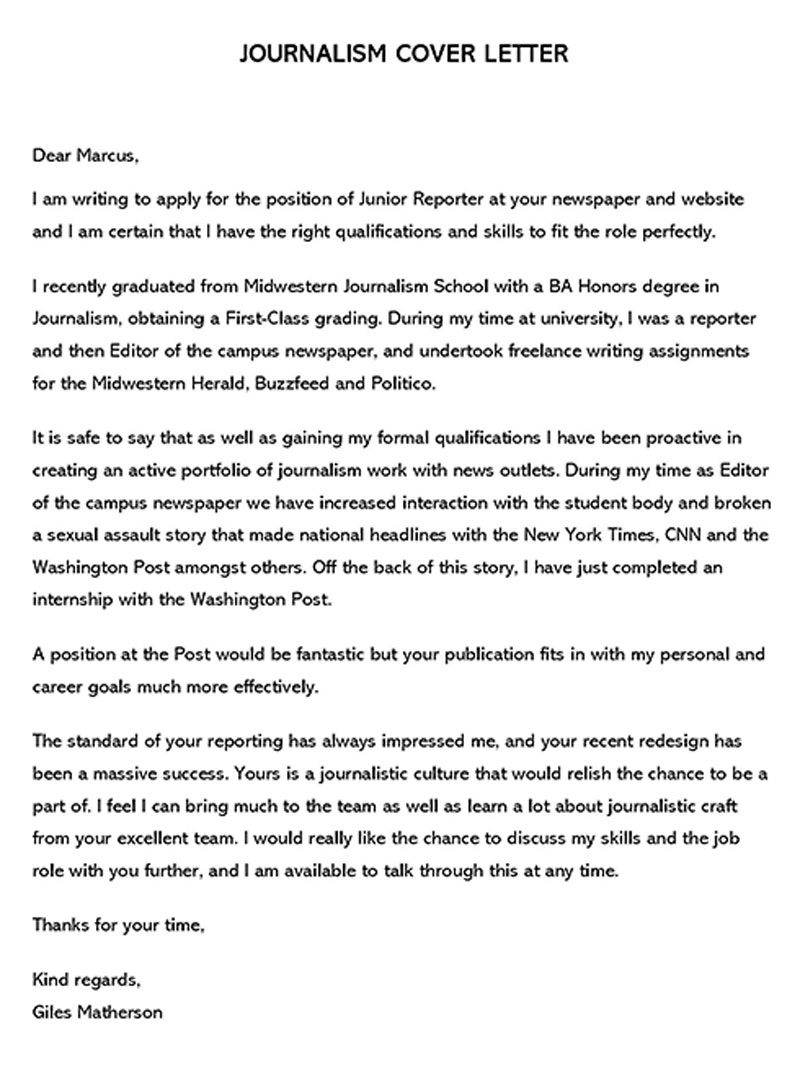
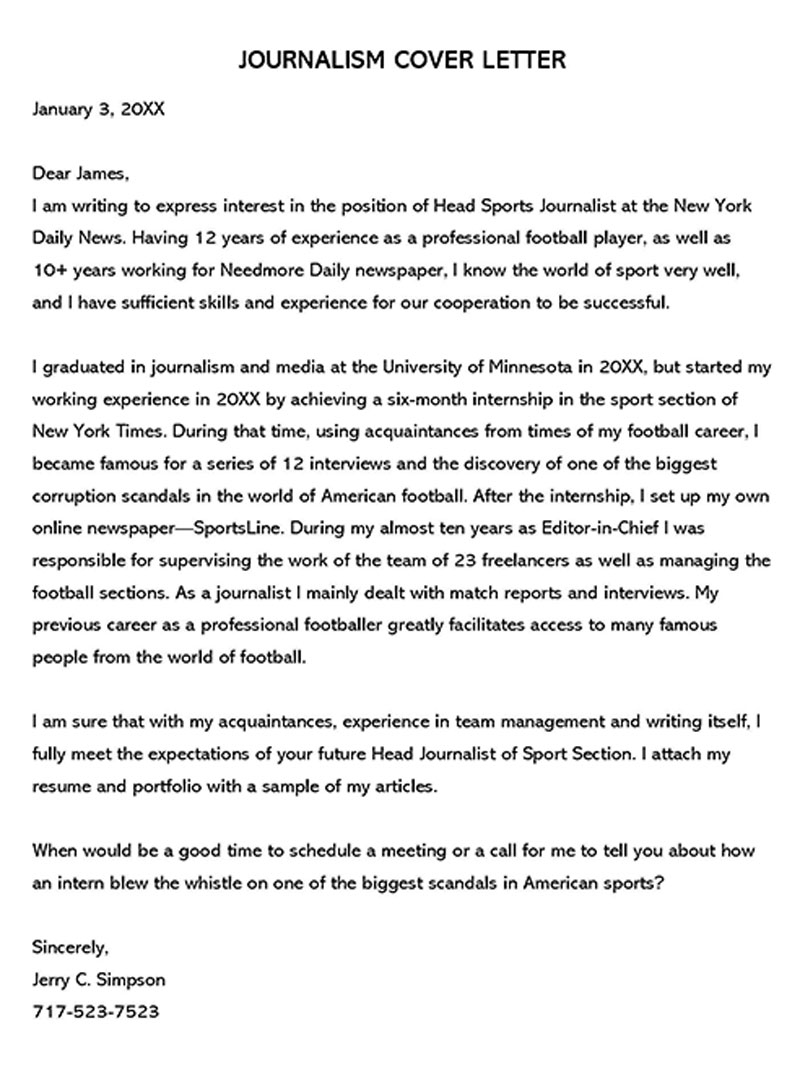
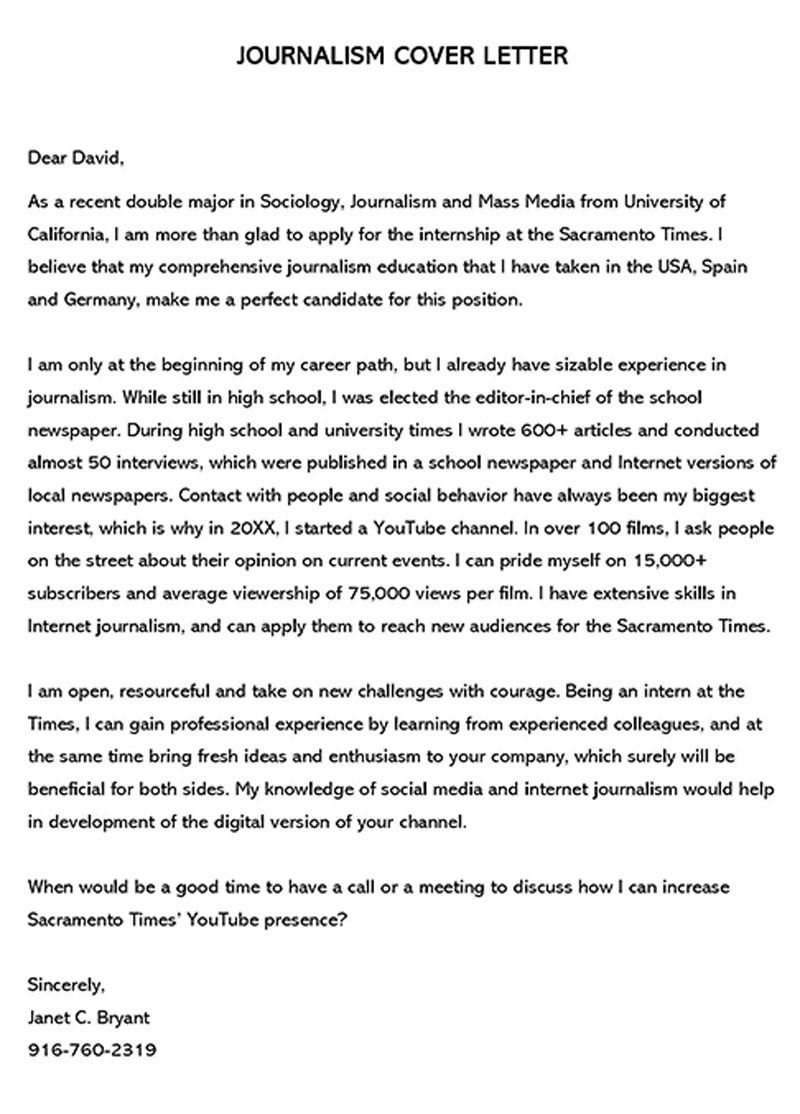
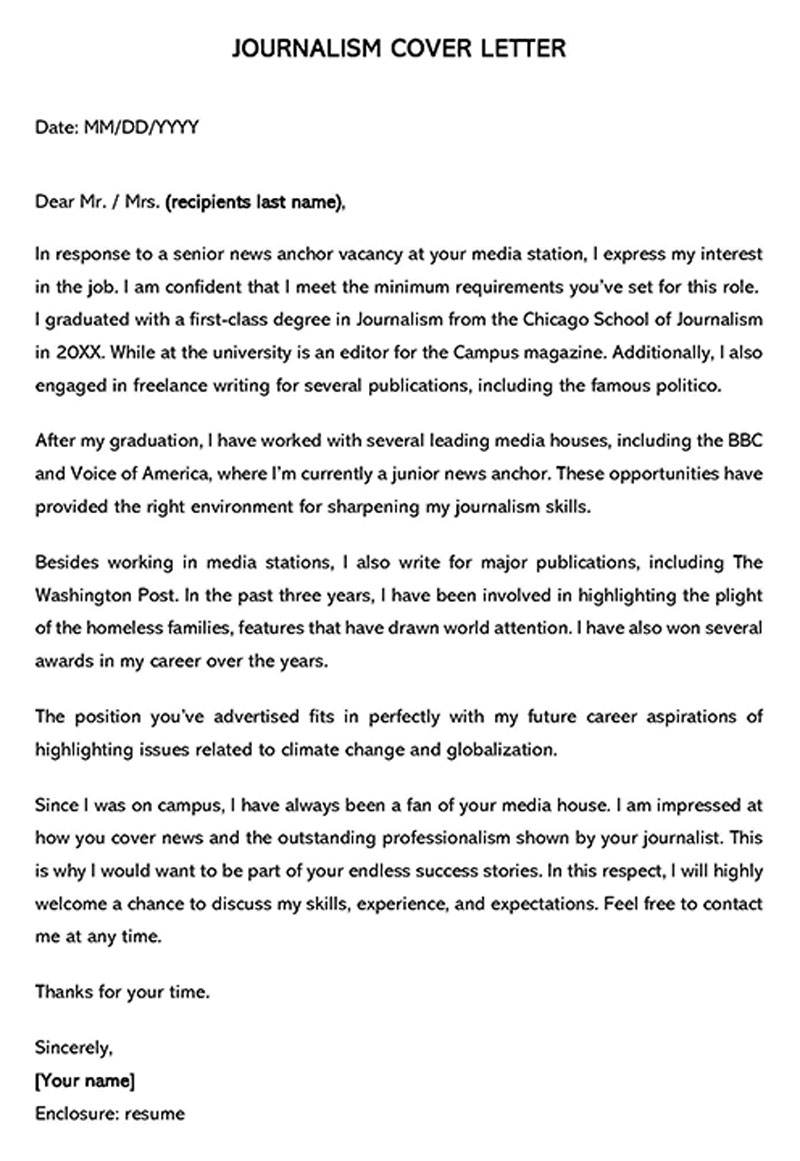
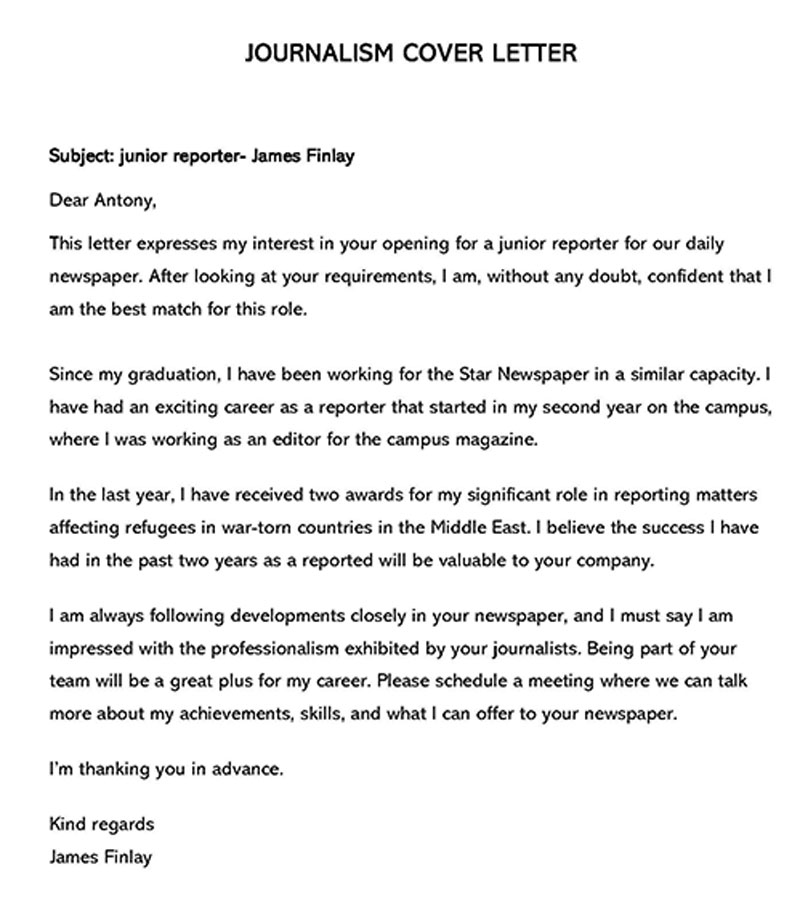
How Long Should a Journalism Cover Letter Be?
An employer typically has limited time to go over the multiple cover letters they receive, so you should keep your cover letter to a maximum of one page. It should be clear and concise. Include a few relevant skills and noteworthy achievements to ensure the length is retained.
Key Takeaways
- A journalism cover letter is fundamentally a document that briefly introduces a candidate and their experience to the employer.
- It should have a concise introduction and body paragraphs that demonstrate your interest in the specific job, relevant skills and qualifications, and the impact you can make on the organization.
- They are often attached to CVs, which are mailed or delivered to employers.
- It should be brief, professional, and focused on attracting an employer.
- In the cover letter, you can reference the experience gained from writing news items from primary sources, conducting interviews, and editing news items for accuracy.
